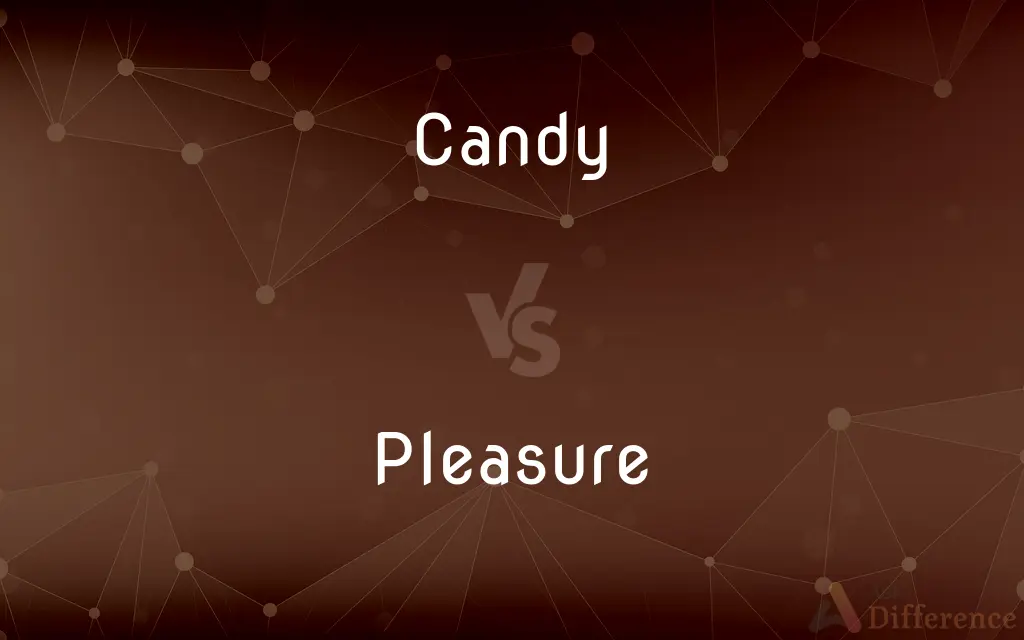Candy vs. Pleasure — What's the Difference?
By Tayyaba Rehman — Published on October 4, 2023
Candy refers to sweet-tasting, flavored confections, typically containing sugar, while pleasure is a feeling of happiness, enjoyment, or satisfaction derived from an experience or activity.

Difference Between Candy and Pleasure
Table of Contents
ADVERTISEMENT
Key Differences
Candy and pleasure represent two fundamentally different concepts. Candy is a tangible item, specifically a confection that is characterized by its sweet flavor, often made with sugar, syrups, and other sweeteners, along with flavorings, colorings, and sometimes, fillings. It’s a physical object, primarily associated with sweet taste and is consumed as a snack or dessert. Candy can be a source of immediate sensory delight and is often associated with festivities and celebrations.
In contrast, pleasure is intangible and denotes a state of feeling. It’s a subjective experience of enjoyment, contentment, or happiness that individuals derive from various activities, experiences, or sensations. Pleasure is not something one can touch or hold; it is felt and experienced. It can be derived from a vast array of experiences, such as enjoying a meal, listening to music, spending time with loved ones, or indeed, eating candy.
While candy is a specific item with a clear, physical form and characteristics, pleasure is a complex, multi-faceted emotion, representing positive responses to stimuli, which can range from sensory pleasures, like the taste of candy, to higher pleasures like aesthetic appreciation or intellectual satisfaction. Pleasure can be fleeting or enduring, and it can be associated with both physical and psychological experiences.
Candy’s role can be seen in its capacity to provide immediate, sensory pleasure due to its sweetness and flavor. Consuming candy can trigger feelings of pleasure by activating certain reward pathways in the brain, associated with the release of dopamine. However, the pleasure derived from candy is just one of the countless forms of pleasures, each varying in nature, intensity, and duration.
To sum it up, candy is a sweet-flavored, tangible confection, while pleasure is an intangible, subjective feeling of happiness or enjoyment that can be derived from a multitude of experiences, including eating candy. One is a physical object with sweet attributes; the other is a mental state reflecting positive emotional response.
ADVERTISEMENT
Comparison Chart
Nature
Tangible, edible item
Intangible, felt emotion
Definition
Sweet-flavored confection usually containing sugar, flavorings, and colorings
Feeling of happiness, contentment, or satisfaction derived from an experience
Source
Physical object consumed as a snack or dessert
Derived from a variety of activities, experiences, or sensations
Variation
Comes in various flavors, forms, and sizes
Can vary in nature, intensity, and duration and can be sensory, intellectual, or aesthetic
Role
Provides sensory pleasure due to its sweetness and flavor
Represents a positive emotional response to stimuli, can be fleeting or enduring, and associated with well-being
Compare with Definitions
Candy
Candy is typically enjoyed as a snack or dessert.
After dinner, he allowed himself a piece of candy.
Pleasure
Pleasure is a feeling of happiness or contentment.
Reading a good book always brings her pleasure.
Candy
Candy often contains sugar and flavorings.
This candy has a mix of strawberry and vanilla flavors.
Pleasure
Pleasure involves a positive emotional response to stimuli.
The music provided much-needed pleasure and relaxation.
Candy
Candy can be chewy or hard.
She prefers chewy candy over hard ones.
Pleasure
Pleasure can be transient or lasting.
The pleasant conversation turned into a lasting pleasure.
Candy
Candy, also called sweets (British English) or lollies (Australian English, New Zealand English), is a confection that features sugar as a principal ingredient. The category, called sugar confectionery, encompasses any sweet confection, including chocolate, chewing gum, and sugar candy.
Pleasure
Pleasure refers to experience that feels good, that involves the enjoyment of something. It contrasts with pain or suffering, which are forms of feeling bad.
Candy
A rich sweet confection made with sugar and often flavored or combined with fruits or nuts.
Pleasure
A feeling of happy satisfaction and enjoyment
She smiled with pleasure at being praised
Candy
A piece of such a confection.
Pleasure
Used or intended for entertainment rather than business
Pleasure boats
Candy
(Slang) An illicit drug, especially one, such as cocaine, that has a sugary appearance or a drug in pill form, such as MDMA.
Pleasure
Give sexual enjoyment or satisfaction to
Tell me what will pleasure you
Candy
To cook, preserve, saturate, or coat with sugar or syrup
Candy apples.
Candy ginger.
Pleasure
The state or feeling of being pleased or gratified.
Candy
Edible, sweet-tasting confectionery containing sugar, or sometimes artificial sweeteners, and often flavored with fruit, chocolate, nuts, herbs and spices, or artificial flavors.
Pleasure
A source of enjoyment or delight
The graceful skaters were a pleasure to watch.
Candy
A piece of confectionery of this kind.
Pleasure
Amusement, diversion, or worldly enjoyment
"Pleasure ... is a safer guide than either right or duty" (Samuel Butler).
Candy
Crack cocaine.
Pleasure
Sensual gratification or indulgence.
Candy
(uncountable) An accessory (bracelet, etc.) made from pony beads, associated with the rave scene.
Candy kid; candy raver
Pleasure
One's preference or wish
What is your pleasure?.
Candy
(obsolete) A unit of mass used in southern India, equal to twenty maunds, roughly equal to 500 pounds avoirdupois but varying locally.
Pleasure
To give pleasure or enjoyment to; gratify
Our host pleasured us with his company.
Candy
(cooking) To cook in, or coat with, sugar syrup.
Pleasure
To take pleasure; delight
The hiker paused, pleasuring in the sounds of the forest.
Candy
(intransitive) To have sugar crystals form in or on.
Fruits preserved in sugar candy after a time.
Pleasure
To go in search of pleasure or enjoyment.
Candy
(intransitive) To be formed into candy; to solidify in a candylike form or mass.
Pleasure
(uncountable) A state of being pleased or contented; gratification.
He remembered with pleasure his home and family.
I get a lot of pleasure from watching others work hard while I relax.
Candy
To conserve or boil in sugar; as, to candy fruits; to candy ginger.
Pleasure
(countable) A person, thing or action that causes enjoyment.
It was a pleasure to meet you.
Having a good night's sleep is one of life's little pleasures.
Candy
To make sugar crystals of or in; to form into a mass resembling candy; as, to candy sirup.
Pleasure
(uncountable) One's preference.
What is your pleasure: coffee or tea?
Candy
To incrust with sugar or with candy, or with that which resembles sugar or candy.
Those frosts that winter bringsWhich candy every green.
Pleasure
The will or desire of someone or some agency in power.
To hold an office at pleasure: to hold it indefinitely until it is revoked
At Congress's pleasure: whenever or as long as Congress desires
Candy
To have sugar crystals form in or on; as, fruits preserved in sugar candy after a time.
Pleasure
Pleased to meet you, "It's my pleasure"
Candy
To be formed into candy; to solidify in a candylike form or mass.
Pleasure
(transitive) To give or afford pleasure to.
Candy
Any sweet, more or less solid article of confectionery, especially those prepared in small bite-sized pieces or small bars, having a wide variety of shapes, consistencies, and flavors, and manufactured in a variety of ways. It is often flavored or colored, or covered with chocolate, and sometimes contains fruit, nuts, etc.; it is often made by boiling sugar or molasses to the desired consistency, and than crystallizing, molding, or working in the required shape. Other types may consist primarily of chocolate or a sweetened gelatin. The term may be applied to a single piece of such confection or to the substance of which it is composed.
Pleasure
(transitive) To give sexual pleasure to.
Johnny pleasured Jackie with his mouth last night.
Candy
Cocaine.
Pleasure
To take pleasure; to seek or pursue pleasure.
To go pleasuring
Candy
A weight, at Madras 500 pounds, at Bombay 560 pounds.
Pleasure
The gratification of the senses or of the mind; agreeable sensations or emotions; the excitement, relish, or happiness produced by the expectation or the enjoyment of something good, delightful, or satisfying; - opposed to pain, sorrow, etc.
At thy right hand there are pleasures for evermore.
Candy
A rich sweet made of flavored sugar and often combined with fruit or nuts
Pleasure
Amusement; sport; diversion; self-indulgence; frivolous or dissipating enjoyment; hence, sensual gratification; - opposed to labor, service, duty, self-denial, etc.
He that loveth pleasure shall be a poor man.
Lovers of pleasures more than lovers of God.
Candy
Coat with something sweet, such as a hard sugar glaze
Pleasure
What the will dictates or prefers as gratifying or satisfying; hence, will; choice; wish; purpose.
Use your pleasure; if your love do not presuade you to come, let not my letter.
Candy
Candy is a sweet-tasting confection.
She chose a piece of candy from the bowl.
Pleasure
That which pleases; a favor; a gratification.
Festus, willing to do the Jews a pleasure
Candy
Candy comes in various shapes, sizes, and colors.
The store had a vast array of candy on display.
Pleasure
To give or afford pleasure to; to please; to gratify.
[Rolled] his hoop to pleasure Edith.
Pleasure
To take pleasure; to seek pursue pleasure; as, to go pleasuring.
Pleasure
A fundamental feeling that is hard to define but that people desire to experience;
He was tingling with pleasure
Pleasure
Something or someone that provides pleasure; a source of happiness;
A joy to behold
The pleasure of his company
The new car is a delight
Pleasure
A formal expression;
He serves at the pleasure of the President
Pleasure
An activity that affords enjoyment;
He puts duty before pleasure
Pleasure
Sexual gratification;
He took his pleasure of her
Pleasure
Pleasure can be derived from various experiences and sensations.
He found pleasure in the simple joys of life.
Pleasure
Pleasure can be sensory, intellectual, or aesthetic.
The artwork gave him a sense of aesthetic pleasure.
Common Curiosities
Is candy an object or a feeling?
Candy is a tangible object, specifically a sweet-tasting confection.
Can candy be considered a source of pleasure?
Yes, many people derive sensory pleasure from the sweetness and flavor of candy.
What does pleasure represent?
Pleasure represents a feeling of happiness, enjoyment, or satisfaction derived from experiences or activities.
Share Your Discovery

Previous Comparison
Hypermarkets vs. Supermarkets
Next Comparison
Cunning vs. ClevernessAuthor Spotlight
Written by
Tayyaba RehmanTayyaba Rehman is a distinguished writer, currently serving as a primary contributor to askdifference.com. As a researcher in semantics and etymology, Tayyaba's passion for the complexity of languages and their distinctions has found a perfect home on the platform. Tayyaba delves into the intricacies of language, distinguishing between commonly confused words and phrases, thereby providing clarity for readers worldwide.
















































